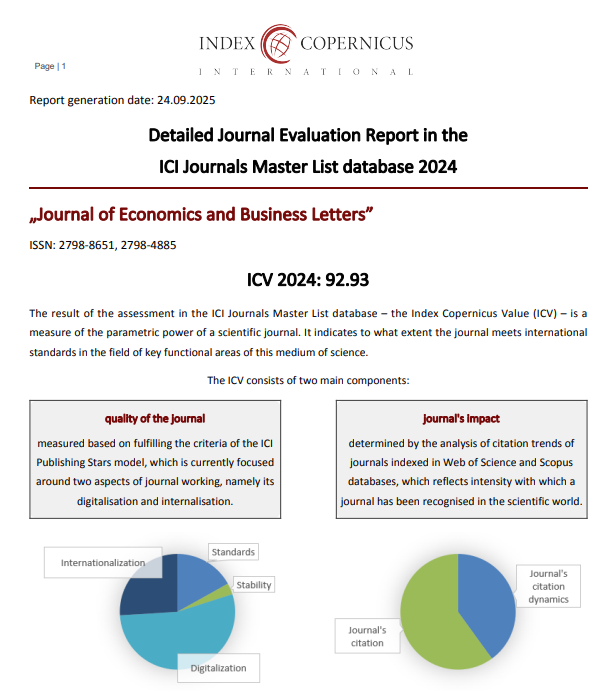Work life balance and pro environmenal behavior on sustainability
DOI:
https://doi.org/10.55942/jebl.v4i5.334Keywords:
work-life balance, pro-environmental behavior, sustainability outcomes, manufacturing sector, IndonesiaAbstract
This study investigates the impact of work-life balance (WLB) and pro-environmental behavior (PEB) on sustainability outcomes in Indonesia's manufacturing sector. As sustainability becomes increasingly important within industrial settings, understanding the role of human-centric factors like WLB and PEB can offer unique insights into achieving sustainable practices. Data were collected from 278 employees across the top four manufacturing companies in Indonesia. Using Structural Equation Modeling (SEM) via LISREL, the study demonstrates that both WLB and PEB significantly contribute to perceived sustainability outcomes. The results indicate that employees who experience a healthy work-life balance are more likely to engage in behaviors that support environmental initiatives, ultimately enhancing organizational sustainability. These findings suggest that promoting a supportive work environment and encouraging eco-friendly behaviors can facilitate sustainable business practices. The study’s implications highlight the importance of integrating employee well-being into sustainability strategies within manufacturing industries, providing actionable recommendations for managers and policymakers aiming to foster sustainable development.
References
Abbas, A., Ekowati, D., Suhariadi, F., Fenitra, R. M., & Fahlevi, M. (2022). Human capital development in youth inspires us with a valuable lesson: Self-care and wellbeing. In Self-care and stress management for academic well-being (pp. 80-101). IGI Global.
Bakker, A. B., & Demerouti, E. (2007). The job demands-resources model: State of the art. Journal of Managerial Psychology, 22(3), 309-328. https://doi.org/10.1108/02683940710733115
Bansal, P., & Roth, K. (2000). Why companies go green: A model of ecological responsiveness. Academy of Management Journal, 43(4), 717-736. https://doi.org/10.2307/1556363
Boiral, O. (2009). Greening the corporation through organizational citizenship behaviors. Journal of Business Ethics, 87(2), 221-236. https://doi.org/10.1007/s10551-008-9881-2
Graves, L. M., Sarkis, J., & Zhu, Q. (2013). How transformational leadership and employee motivation combine to predict employee pro-environmental behaviors in China. Journal of Environmental Psychology, 35, 81-91. https://doi.org/10.1016/j.jenvp.2013.05.002
Greenhaus, J. H., & Powell, G. N. (2006). When work and family are allies: A theory of work-family enrichment. Academy of Management Review, 31(1), 72-92. https://doi.org/10.5465/amr.2006.19379625
Haar, J. M., Russo, M., Sune, A., & Ollier-Malaterre, A. (2014). Outcomes of work-life balance on job satisfaction, life satisfaction, and mental health: A study across seven cultures. Journal of Vocational Behavior, 85(3), 361-373. https://doi.org/10.1016/j.jvb.2014.08.010
Hemingway, C. A., & Maclagan, P. W. (2004). Managers' personal values as drivers of corporate social responsibility. Journal of Business Ethics, 50(1), 33-44. https://doi.org/10.1023/B:BUSI.0000020964.80208.c9
Kelliher, C., & Anderson, D. (2010). Doing more with less? Flexible working practices and the intensification of work. Human Relations, 63(1), 83-106. https://doi.org/10.1177/0018726709349199
Lin, Z., Gu, H., Gillani, K. Z., & Fahlevi, M. (2024). Impact of Green Work–Life Balance and Green Human Resource Management Practices on Corporate Sustainability Performance and Employee Retention: Mediation of Green Innovation and Organisational Culture. Sustainability, 16(15), 6621.
Maskuroh, N., Widyanty, W., Nurhidajat, R., Wardhana, I., & Fahlevi, M. (2023). Green human resource management and green supply Chain Management on Sustainable performance of nickel mining companies in Indonesia. Uncertain Supply Chain Management, 11(1), 203-212.
Mushtaq, M., Ahmed, S., Fahlevi, M., Aljuaid, M., & Saniuk, S. (2022). Globalization and employment nexus: Moderating role of human capital. Plos one, 17(10), e0276431.
Norton, T. A., Parker, S. L., Zacher, H., & Ashkanasy, N. M. (2015). Employee green behavior: A theoretical framework, multilevel review, and future research agenda. Organization & Environment, 28(1), 103-125. https://doi.org/10.1177/1086026615575773
Ones, D. S., & Dilchert, S. (2012). Environmental sustainability at work: A call to action. Industrial and Organizational Psychology, 5(4), 444-466. https://doi.org/10.1111/j.1754-9434.2012.01478.x
Setyaningrum, R. P., Ratnasari, S. L., Soelistya, D., Purwati, T., Desembrianita, E., & Fahlevi, M. (2024). Green human resource management and millennial retention in Indonesian tech startups: mediating roles of job expectations and self-efficacy. Cogent Business & Management, 11(1), 2348718.
Shah, S. H. A., Fahlevi, M., Rahman, E. Z., Akram, M., Jamshed, K., Aljuaid, M., & Abbas, J. (2023a). Impact of green servant leadership in Pakistani small and medium enterprises: bridging pro-environmental behaviour through environmental passion and climate for green creativity. Sustainability, 15(20), 14747.
Shah, S. H. A., Fahlevi, M., Jamshed, K., Aman, N., Rafiq, N., Jermsittiparsert, K., & Aljuaid, M. (2023b). Sustaining the earth: Unraveling the synergy of workplace spirituality, responsible leadership, and pro-environmental behavior in Pakistan’s SMEs. Psychology Research and Behavior Management, 3075-3093.
Shanafelt, T. D., Hasan, O., Dyrbye, L. N., Sinsky, C., Satele, D., Sloan, J., & West, C. P. (2015). Burnout and satisfaction with work-life balance among US physicians relative to the general US population. Archives of Internal Medicine, 172(18), 1377-1385. https://doi.org/10.1001/archinternmed.2012.3199
Statistics Indonesia. (2023). Indonesia’s economic indicators. Statistics Indonesia. https://www.bps.go.id
Downloads
Published
How to Cite
Issue
Section
License
Copyright (c) 2024 Nurhasanah Nurhasanah, Ezky Tiyasiningsih

This work is licensed under a Creative Commons Attribution 4.0 International License.
















